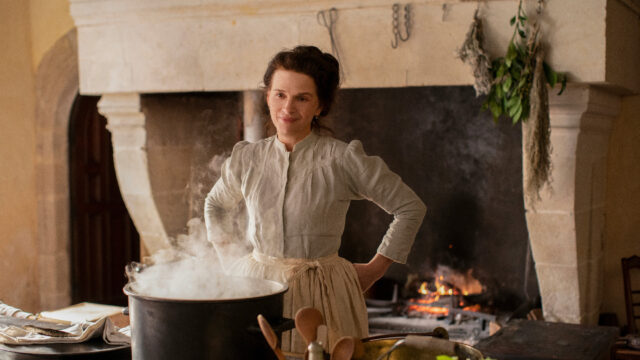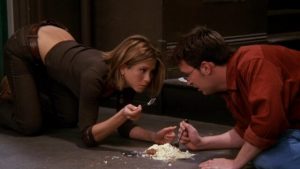
The post The Taste of Things: Carving and Serving, by Scott Nye appeared first on Battleship Pretension.
The classic “dinner and a movie” date set-up never quite tracked to me. You either have to eat quite early or catch a later movie, by which time you’re prone to falling asleep, not in the least because you just had a large meal. Or you catch an earlier show and eat later, which raises its own complications. But it sometimes seems when you watch old movies that people just used to live heartier lives that ran later into the night, and good on them. Nevertheless, this grand tradition should make a comeback for at least one motion picture this year, as I would greatly caution readers to not do as I did and merely have a semi-sufficient sandwich before seeing Tran Anh Hung’s The Taste of Things – get yourself something large, and a little bit decadent, for you are in for a mouthwatering two hours.
Eugénie (Juliette Binoche) and Dodin (Benoît Magimel) live through action. The year is 1885. He is a renowned chef. She is the one who really makes the food. They have worked together for twenty years, and somewhere along the way, developed a romance that he would like to see become a marriage. She is less inclined to do so; why spoil a good thing? And in their eyes, you can see they have a good thing. But they are getting older, and she is experiencing some manner of illness that is slowing her down, or maybe the seasons are just changing the right way, or maybe it really is the elaborate dinner he makes for her, but she’s starting to think they could make a fine second half of their lives together in a more formal way.
Cinematographer Jonathan Ricquebourg is no stranger to capturing beauty – he made Jean-Pierre Leaud dying in a room for two hours exquisite in The Death of Louis XIV – and even if your sole interest in this film is “beautiful French people making beautiful food,” the film will reward you tremendously and ask little else from you. The dishes are extraordinary, lit like they’re the prized sculptures at a museum, and constantly compounding and complicating themselves. So many times watching them prepare a dish, I thought to myself “ah, perfect, ready to eat!” only for there to be another two or three stages to its preparation that exponentially increased its appeal. So, too, seemed to be the experience of the audience I saw it with, who couldn’t help but laugh as things became more and more succulent.
Binoche cemented her American reputation with a period romance piece when she won the Oscar for The English Patient, and she has returned to the genre periodically, delivering if not her most challenging work, some of her most pleasing and genial performances. The Taste of Things is inspired by a novel by Marcel Rouff that begins with Eugénie already a memory. Binoche is tasked with playing an ideal that must also have agency. Eugénie appeals to Dodin specifically because she resists him, because she maintains the mystery of her independence; marriage has ruined lesser things. Yet their slow dance throughout the course of the film suggests little could ruin their affair save for tragedy.
Rare is the romance that’s bound by work, and for that matter, work bound by romance. Often one spoils the other. To luxuriate in both, together, is a life’s purpose and a mission most couples funnel into their children. Watching them sculpt these dishes together, one recognizes instantly their work is their child, the thing they are bringing up together and watching flourish under their care. Watching them move through a meal, step by step, piece by piece, for most of the first act is not only a matter of satisfying an audience – no small measure of success itself – but in showing who these people are through how they work. Hung can then omit the sex scene we all still hunger for nonetheless; through a different way of working one’s body, he has already shown them do so.
The post The Taste of Things: Carving and Serving, by Scott Nye first appeared on Battleship Pretension.
The post The Taste of Things: Carving and Serving, by Scott Nye appeared first on Battleship Pretension.

